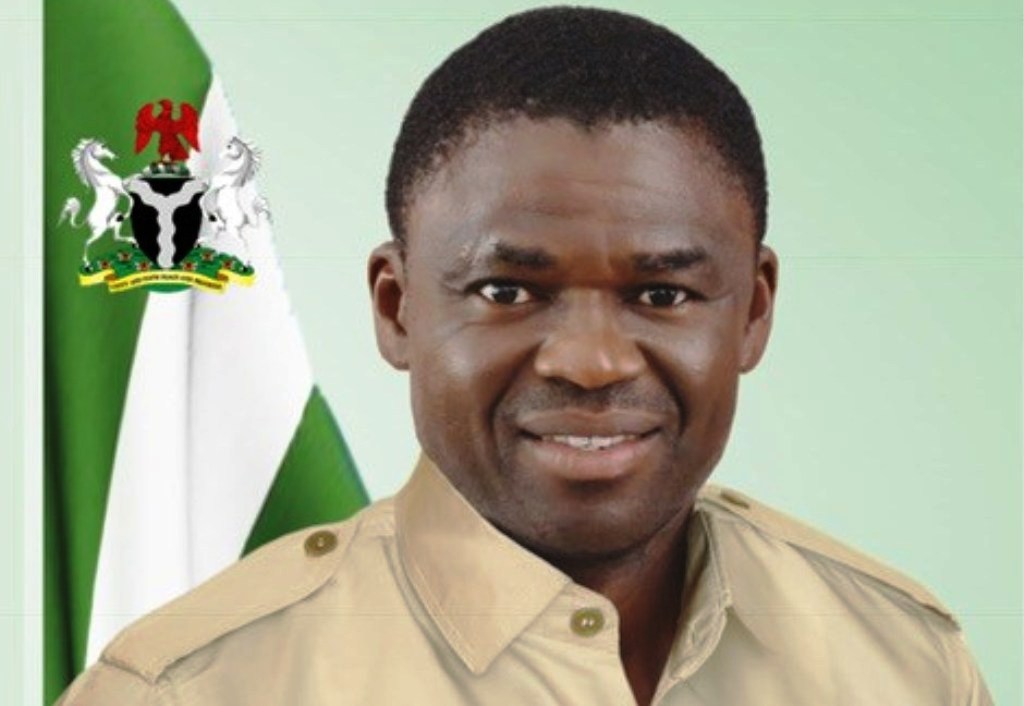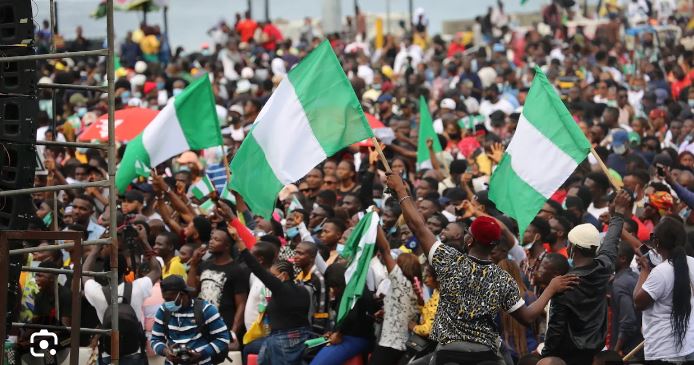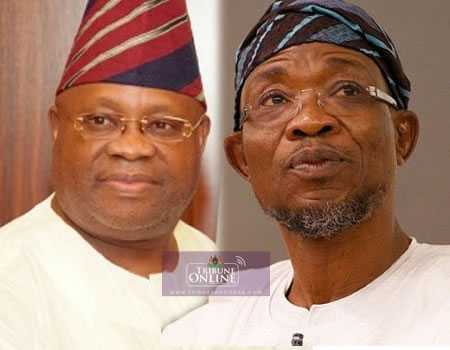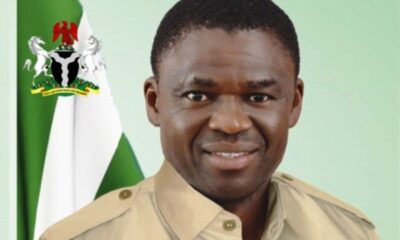Opinion
The rise and fall of Philip Shaibu

By Bola Bolawole
Edo State deputy governor, Comrade Philip Shaibu, has kicked the canvass; he was impeached by the Edo State House of Assembly days ago and a replacement was promptly provided by his erstwhile boss, Gov. Godwin Obaseki. Shaibu was in court while his impeachment was being perfected; we await the court’s verdict but time is not on his side. Governorship elections are due in the state on September 21st, a few months from now. It is said that one of the reasons why Shaibu had to be impeached was his insistence on contesting the governorship position in that election; apart from other “irreconcilable differences” between him and Obaseki.
Shaibu’s desire from Day One, and the pact he thought he had with his boss, was that Obaseki would hand over the baton of leadership to him; an “emilokan” kind of arrangement. And while the good times lasted between the two buddies, Shaibu enjoyed it to the hilt. He was loud! He was visible! He was influential! He was powerful! He was feared! He made Obaseki’s enemies his enemies and Obaseki’s friends his friends. He fought battles on behalf of Obaseki and waged wars in defence of a man he held dear. But nothing lasts forever and spanners often get thrown into the works. Gentlemen’s agreements are often honoured in their breach and what goes around, as they say, comes around! The reasons for this are not far to fetch.
The period between one election and another is damn too long for anyone to gain say what can happen along the line. Just one night – usually referred to as the night of long knives – can change many things. Politicians always lack fidelity; they make agreements, knowing full well that they will break them. That is why our people refer to any agreement with politicians derisively as “adehun alagbada.” Agreements made by politicians wearing flowing robes (agbada or babariga). You trust such agreements to your chagrin. Sometimes the politicians themselves are not to blame: shifting alliances dominate politics; today’s friends are tomorrow’s enemies; and political permutations are in a state of constant flux. Hence, the saying that there are only permanent interests and not permanent friends – or enemies. Especially here in Nigeria where our politics lacks principles and ideological underpinnings and political parties are nothing but Special Purpose Vehicles or mere platforms for the purpose of contesting elections.
Few deputy governors serve out their term gracefully; fewer, still, succeed their boss. The reasons for this are also many. To start with, not many governors are agreeable to the running mate chosen for them. All manner of interests play a role here and the principal oftentimes simply stomachs his misgivings so he could achieve his goal before he begins to think of what to do next. Where a deputy governor is stronger politically than his boss, that is a disaster waiting to happen. Once the governor finds his feet, his next project will be how to cut his deputy to size. Where a deputy loves to hug the limelight, it is a matter of time before he falls out of favour with the boss.
There were people who contested the running mate slot and were not happy they lost out. And from Day One of the administration, there are people scheming to replace the sitting deputy. A deputy that has a mind of his own will also not be a good friend of the boss. Leaders here love docile and pliant subordinates and followers. They want someone who will not outshine them if he succeeds them. They want someone who will not probe them after they leave office. They want someone who will cover their tracks for them. They hate anyone with a strong personality or character. They will not stomach anyone who has a mind of his own.
If you think a deputy governor is close to the governor, you will be deceiving yourself; the razzmatazz and public show of effusive affection notwithstanding. They may be Number One and Number Two but that is where the closeness ends; they may be poles apart in their thinking, political philosophy, orientation and way of life. They may belong to different political camps and may harbour divergent opinions on critical issues. Some governors and their deputies are like night and day, light and darkness. Their marriage of convenience is just for them to win an election, after which the competition and trouble begin.
I once was in a meeting where we were discussing with the governor until the Deputy Governor walked in. The conversation stopped abruptly but the JJC that I was, I resumed the conversation after the usual pleasantries but soon noticed that everyone else was quiet. So, I, too, went numb. After Her Excellency had left, His Excellency scolded me severely: “My man, why were you talking so freely before a stranger?” A stranger? The deputy governor in an administration was a stranger, I asked. “Yes! Is she one of us?”
So, you can be Number Two in an administration and yet be a stranger! I also witnessed a governor ditching people who were instrumental to his winning an election only to pitch his tent with a political neophyte with no political base. I took him up! He listened to me patiently and then replied mockingly: “Excuse me, Sir, the politics you learned is that of the classroom; the politics that we are practising here is that of the streets. What benefit will it be to me and you if we support a person to win an election and after that, you and I will no longer have access to this Dining Room (in the Government House)?” I simply gazed at his mouth! Realpolitik!
Very few bosses will support a strong personality to take over from them. Bosses are averse to a deputy who has a mind of his own. These are fundamental truths that anyone aiming to play second fiddle must understand before throwing their hat in the ring. Another useful hint is to take this advice of the elders very seriously: Prepare for the trouble that is certain to come when things are still rosy between you and your boss. Scriptures say in the Book of Habakkuk, it may tarry but it will surely come. And because it will surely come, it will not tarry! What do you make out of that? China’s revolutionary leader, Chairman Tsetung Mao, put it this way: “To have peace, prepare for war!” Does this sound contradictory? Diplomats and theorists of war define this as the principle of detente or of mutual assured destruction (MAD). Mad indeed! Scriptures again say the horse is prepared for the day of battle, not on the day of battle. Shaibu appeared not to have taken the wisdom of the elders to heart.
To survive as a deputy, you must wear loyalty and servility like a badge. This must radiate in you inside-out. Either you have this gift endowed in you from heaven or you learn how to stoop to conquer. How many politicians can stomach what Asiwaju Bola Ahmed Tinubu put up with to become Mr. President? I once listened to the head of a Mission, a highly-respected man of God, give the criteria needed before any pastor could be promoted to the topmost echelon of the organisation: “Someone who has not, not even once, raised his voice against the authorities”! And I marveled! Lick spittle? That criteria is even stricter than that of Stephen Decatur when he said: “Our Country! In her intercourse with foreign nations may she always be in the right; but right or wrong, our Country!” Decatur at least wished that his Country would make an effort to be in the right! It will be much easier for a camel to pass through the eye of a needle than for a deputy to satisfy some bosses.
This, however, is not to discourage the likes of Shaibu from challenging ungrateful, use-and-dump bosses; whether they succeed or fail does not really matter. One such politician succeeded some years back: his name is Olusegun Mimiko in Ondo State. Mimiko dared the sitting president, Olusegun Obasanjo, to resign as Obasanjo’s Minister of Housing and Urban Development and take on the incumbent governor of Ondo State, Olusegun Agagu. Mimiko built the Labour Party from scratch and, with it, ran a campaign that unhinged the then ruling PDP and unseated the sitting governor, Agagu. The election was blatantly rigged – I was on ground in the state as Media Consultant to Agagu and witnessed it live and direct – but the court eventually restored Mimiko’s stolen mandate.
History often repeats itself, especially with those who fail to learn from history, as George Santayana has posited. There is, therefore, nothing wrong if Shaibu tries his luck in Edo state. Maybe he will be the next giant-killer! Even if he is not, there is no harm in trying because every experience deepens our renascent democracy.
FEEDBACK
Nigeria: between religion economy and knowledge economy
A beautiful piece that aptly captured my feelings and thoughts on how religious activities contributed to the economic woes/crisis and general backwardness of the country. – Oso Victor Gbolahan.
Am blessed and educated by this article. It really opened my eyes to see the foolishness of religion economy taking priority over the knowledge economy. I now have a better understanding why Nigeria is the poverty capital of the world! Indeed, it will continue to be until we move from religion economy to knowledge economy. Pilgrimage should be a personal responsibility. – Aderemi Ajadi Desalu.
We have to expose the rot in all subsidies associated with religion so as to promote an effective knowledge economy that can rebuild the Nation. Nigeria can, and will be, better than it is now if we do away with religion economy. – Palcorub Nig. Ltd.
It is possible that Nigerians flock to churches and mosques because they think that their hope lies there. And the churches themselves may be bearing the weight of Nigeria’s failure because its members face the suffocating atmosphere of Nigeria’s stagnation and its attendant influence and corruption. I think, therefore, that it is not the complete truth that Nigeria is the way it is because Nigerians are religious but, rather, because Nigerians pay lip-service to religious teachings. – Ayodele Iyiola.
Bolawole is a former Editor of PUNCH newspapers and also a public affairs analyst on radio and television.
Opinion
Are youths the panacea for Nigeria’s problems?


By Temitope Tbog Omoakhalen
In 2021, after the COVID-19 pandemic, my husband and I engaged in a pet project that required us conducting candid interviews with people on the streets to gain insight into their perceptions of Nigeria, their expectations of government and their sense of ownership of a Nigerian dream. It was an interesting season of my life that afforded me the opportunity to just hear first-hand what everyday Lagosians were thinking. There was an encounter with a young lady, however, that left an indelible mark on my consciousness. She said to me, “TBOG, at the tender age of six, I was called ‘the leader of tomorrow’. I just turned forty, yet, the promise of tomorrow still eludes me. When will my tomorrow come?” Her words touched me deeply because it echoed a sentiment shared by many who have long been called, THE LEADERS OF TOMORROW. “When will our collective tomorrow materialise, and what form will it assume?” many youths ask.
For a long time, the youth have been told to wait for their turn to lead the nation. As the years have passed and the vista of tomorrow appears distant, one cannot help but question the accuracy of the ‘waiting period.’ Will the youth ever have their turn at power, or will it have to be forcefully grabbed? Are youths even ready to handle the reins of power or are we just too inexperienced to know what to do with it? Would Nigeria progress as a nation if it had an infusion of youthful energy to invigorate governance structures or would our much-touted inexperience cause us to falter under pressure, make costly mistakes, or succumb to the allure of power without proper accountability? If they had the opportunity, would the current crop of youths be any different from the older generation of leaders they fiercely condemn or would they become the breath of fresh air Nigeria needs? While these are burning questions on the minds of many, I am compelled to take Lagos, once again, as my model.
Lagos State boasts of the most vibrant and dynamic population of young people in the country. Many of Nigeria’s young leaders and change-makers have their roots in Lagos, the likes of Iyinoluwa Aboyeji, Olugbenga Agboola, Folarin Falana (Falz), Debo Adedayo (Mr. Macaroni), Tunde Onakoya, Hilda Baci, Debola William, Chude Jideonwo, Yemi Adamolekun among others who are all thriving in their various spheres of influence, from technology to arts and entertainment to media to civil society, placing Nigeria in global conversations. This suggests that the youth have the potential to make a difference if given the opportunity in the political arena. Thankfully, the current Minister of Communications, Innovation and Digital Economy, Dr Bosun Tijani, is a young Nigerian whose inspiring story is traceable to the Centre of Excellence. Moreover, did you know that in Governor Babajide Sanwo-Olu’s cabinet, there are young people in their thirties holding key positions? Some of his Senior Special Assistants were in their twenties when he took office and they have since grown to head agencies within the state, contributing their quota to the decision-making process. For these ones, their tomorrow has come; they have become the leaders of today.
Mr. Governor recognises the untapped potential of youth and is committed to investing in this potential. No wonder the Lagos model is a departure from the longstanding tradition of political leadership dominated by the older generation. The Lagos model is a definite paradigm shift in governance dynamics. This should not be very surprising given that Lagos is a forward-thinking state driven by the THEMES+ agenda. Besides, Lagos has historically provided an enabling environment for young people to thrive across various sectors even as the political environment has been characterised by intergenerational integration and continuity of vision. This is a commendable model that other states must consider adopting. While there are indicators of increased youth participation in several states across the nation, to accurately measure inclusion, a Youth Participation Index that evaluates the gains of the Not-Too-Young-To-Run Act and the involvement of youth in appointive positions would be a valuable additional contribution from civil society groups. While I believe that Lagos State would top such an index, I recognise that there is still much room for progress in the inclusion of young people in public leadership across the nation.
Among public officials, there are two schools of thought on youth involvement in public leadership. On the one hand, there is the belief that incorporating youth in politics and governance would trigger a positive disruption through the introduction of innovative ideas, digital savvy, and a deeper connection with contemporary issues facing the populace. This school of thought holds that the idealism of youth as well as our passion for change offers a promising antidote to stagnant bureaucracies and the entrenched systems that currently impede transformative outputs. This school of thought further holds the opinion that since many among the present-day older generation of leaders began their leadership journeys as youths, it would be only just for them to yield the floor to the present-day younger generation. On the other hand, there are those who hold sacred the age-old wisdom of experience. The holders of this opinion argue that governance is a complex matter requiring the nuanced understanding and institutional knowledge that can only be found among seasoned politicians and administrators. They believe that youthful idealism could become a pitfall without practical wisdom gained through years of service and leadership.
My thoughts regarding these two positions are very simple. Leadership is a skill that must be forged in the crucible. I do not think that the youths, in themselves, are the panacea to Nigeria’s problems. I do not think power should be given to anyone simply because they are of a particular age bracket. I think the making of the Nigeria of our dreams is the collective responsibility of the old and the young because we need the wisdom of the old and the energy of the youth to make this nation work. But this is also not an endorsement of the status quo. If we had to choose between the ebullience and innovation of the youth on the one hand and the conventionality and steadfastness of the old on the other, I would likely go for the former. But what Nigeria needs, beyond creativity and passion, is patriotism and people of character; people who love their nation and can defend her, come what may. These kinds of people are first forged in the home before they are released to the nation. If parents do not rise to take charge of the value and moral components of their children’s growth and development, a pipeline of value-driven youthful leaders would be a pipe dream.
As a youth, I may be castigated for even considering that the older generation should still have a say at the table, but life has shown me that there are unpatriotic and corrupt youths as much as there are nationalistic and reliable older leaders. As a Fellow of The Lateef Jakande Leadership Academy, I have seen and worked with political leaders and bureaucrats who possess professionalism and integrity – value systems that I hardly thought that I would encounter in the public sector and that I never believed even existed among politicians. Among the old as well as the young, I have seen the propensity for the good as well as the inclination to the not-so-desirable. This has compelled a rethink of the notion of age as the sole determinant of leadership emergence in our nation. While it is my utmost delight to see more young people emerge as leaders in Nigeria, I am concerned that if the production process is not thoroughly curated to produce a generation of leaders who are passionate and patriotic and possess the character and competence required for governance, we would replicate the corruption that currently eats at the soul of our nation, except that this time, it would be with an exuberance that could bring our nation to its knees.
This was why, when the Lateef Jakande Leadership Academy (LJLA) convened its first-ever Lagos Leadership Summit (LLS) held on April 17, 2024, tagged, Leadership and Nigeria’s Future, expectation surged in my heart that the event would kickstart fresh conversations around the integration of a new generation of trained and tested leaders. I was not disappointed. As the Honorable Commissioner for Innovation, Science & Technology, Olatubosun Alake, pointed out at the event, there are older leaders devoid of patriotism, just as there are callous youths hungry for power. The goal, in my opinion, is an integrated approach where the wisdom of age converges with the dynamism of youth. Mentorship programs, intergenerational dialogues, knowledge exchange opportunities and leadership training initiatives, all of which the LJLA and LLS embody, can bridge this gap. By harnessing the complementary strengths of diverse generations, Lagos is already cultivating a leadership ecosystem that is resilient, adaptable, and responsive to the needs of its diverse populace. No wonder we boldly say: This is Lagos, the Centre of Excellence, the Nigerian model for city transformation and the reference point for all other states.
Temitope is a Fellow, Lateef Jakande Leadership Academy.
Opinion
Naira’s slump: Urgent action needed to restore stability


By Kenechukwu Aguolu
The recent rebound of the Naira brought a glimmer of hope to Nigerians amidst the backdrop of economic uncertainty. However, skepticism soon emerged as many questioned the underlying factors driving this increase in value. Concerns arose that the Naira’s rise may have been artificially influenced, either through defending the currency with foreign loans or tapping into the country’s foreign reserves. In response to these speculations, the Central Bank of Nigeria’s Governor vehemently denied any such manipulation, asserting that the Naira’s upward trajectory was a result of the government’s strategic policies aimed at stabilising the currency.
However, in the past few days, the Naira has experienced a decline in value, prompting widespread unease, and clarity regarding the exact causes of its depreciation remains elusive. Various theories have emerged, ranging from the impact of speculative activities in crypto-currency platforms to the Central Bank’s cautious stance amid dwindling foreign reserves. The lack of definitive explanations only serves to exacerbate the prevailing uncertainty surrounding the Naira’s future path, leaving citizens and investors alike on edge.
Despite recent attempts by the Vice President to reassure the public regarding the Naira’s resilience, the potential consequences of a sustained decline cannot be overstated. A loss of faith in the government’s ability to manage the economy could further destabilise an already precarious situation. Moreover, a weakening Naira threatens to reignite a frenzy for foreign currencies, jeopardising financial stability and will also deter much-needed foreign direct investment, thus hindering economic growth. The looming specter of a return to the pre-rebound era of financial instability looms ominously, underscoring the urgent need for decisive action.
Given these pressing challenges, the government must demonstrate swift and resolute leadership to address the root causes of the Naira’s decline and restore confidence in the currency. A comprehensive diagnosis is paramount to identify the underlying factors contributing to the Naira’s weakness. Only by understanding the root causes can effective solutions be devised and implemented to shore up the currency’s value and stabilise the economy.
Furthermore, the government must redouble its efforts to diversify the economy away from its heavy reliance on oil revenues. While this remains a long-term strategy, accelerating the implementation of diversification policies is crucial to reducing Nigeria’s vulnerability to the shockwaves caused by oil price fluctuations. By promoting other income sources such as agriculture, manufacturing, and technology, Nigeria can mitigate the adverse effects of volatile oil prices on its economy and currency.
In conclusion, immediate and decisive action is imperative to prevent the Naira’s decline from spiraling into a full-blown crisis. The government must act swiftly to address the root causes of currency instability, restore trust in the Naira, and pave the way for sustained economic growth and prosperity. The time for action is now, and the stakes could not be higher for the future of Nigeria’s economy.
Opinion
Adeleke v Aregbesola: The price of political treachery


By Dr Jimoh Olorede
Preparatory to the July 2022 governorship election in Osun State, and since thereafter, until recently, the ex-governor and immediate-past Minister of Interior, Ogbeni Rauf Adesoji Aregbesola, a top beneficiary of the All Progressives Congress (APC) party, as a two-term commissioner in Lagos, two-term governor in Osun, and minister consecutively, suddenly became an abettor and a conspiratorial ally to an opposition gubernatorial candidate, Senator Ademola Adeleke, against his party, APC, and his successor, Adegboyega Oyetola, who served as his Chief of Staff, succeeded him as governor, and was seeking a reelection! The gubernatorial election was held, Adeleke won, Oyetola lost, but subsequently appointed as minister, while Aregbesola left the political stage as minister and got back home!
Oyetola’s open and obvious sin for which he must be crucified, and was actually dealt with, at least, in the myopic estimation of Aregbesola and his co-conspirators, was ‘reviewing and reversing his Schools Reclassification Policy’, by which Oyetola actually rekindled people’s hope, and what they perceived as a retrieval of their ‘lost glory and education origin’, with his return and reversal of the changed public schools’ founder-cum-original names and unique uniforms to the status quo. This happens when a government is consent of the governed.
His (Oyetola’s) hidden, how-do-we-say-it sin for which he must be punished was what Ogbeni would term ‘deployment of his magic wand’ with which he was able to pay full salaries of the state workers, which Aregbesola could not, or perhaps did not, given the inherited jugular-strangling and throat-squeezing debt into which he plunged the state. These were Oyetola’s obvious and hidden sins for which the ‘political structure and APC house’ built in Osun by Asiwaju Bola Tinubu, through Aregbesola and others, must be demolished and totally rent asunder.
Since the creation of Osun State, ten people have served as governor, with four military governors and six civilian governors. While the first (military) governor, Leo Segun Ajiborisha, served the shortest term of four months, from 27 August 1991 to 3 January, 1992, Ogbeni Rauf Adesoji Aregbesola so far, served the longest term of eight years as governor, from November 27, 2010 to November 27, 2018. However, within this period of eight years of the longest-serving governor, so many things had happened in and to the state. One of those things was the changing and renaming of the state from Osun State to “State of Osun”. The ex-governor must have seen an error which none of his seven predecessors who had ruled the state before him could see.
He also created and introduced a different state Anthem, Logo, Crest and Flag. Apart from the humongous loan repayment, Oyetola also inherited these “Aregbesola-personified legacies” about which he had to be silent, as it was a moral burden, and rather maintained and sustained the status quo throughout his administration, feigning pretense as if he didn’t see anything wrong just to avoid crisis or rift with Aregbe.
Alas, Governor Ademola Adeleke eventually betrayed his ‘mission-fellow’, an abettor and co-conspirator, Ogbeni Rauf Aregbesola, who maliciously joined forces with him against his own party and successor. He has obliterated all Ogbeni’s known legacies in the state. No sooner had the governor taken the oath of office than he started repealing Aregbesola’s legacies right at the venue of his inauguration. While delivering his inaugural speech, governor Ademola Adeleke publicly said: “Consequently, I hereby issue the following directives which will be backed up with appropriate Executive Orders.
“. . . Three, and immediate reversal to the constitutionally recognized name of our state – Osun State. All government insignia, correspondences, and signage should henceforth, I repeat, should henceforth reflect ‘Osun State, rather than ‘State of Osun’, which is unknown to the Nigerian Constitution.”
Nigerian politics is a treacherous game. There’s no permanent friend or enemy in politics, as politicians deceitfully use and dump each other. Adeleke knew Aregbesola was smart; he consequently cynically stooped to outwit his smartness, and Ogbeni unwittingly misconstrued his betraying kindergarten dancing posture for stupidity.
Also, while Oyetola maintained and sustained the legacy, and retained the nomenclature “OYES” (Osun Youth Empowerment Scheme) as birthed and christened by Aregbesola, governor Ademola Adeleke dissolved the OYES Corps to be renamed after his ‘Imole Youth’. The governor, through his spokesperson, condemned what he referred to as ‘content of the programme’ which, according to him, turned people to grass-cutters and market sweepers. Similarly, on many occasions, I have heard Adeleke-led PDP condemn Aregbesola’s government in the media, bemoaning that he failed to complete any road in eight years, and so on.
Eventually, the scenario turned out to be Adeleke paying Aregbe in his own coins! Based on malice and ill-will, and for his immediate ego satisfaction, Aregbesola sacrificed his party’s future gains, jeopardizing the fortune of many, thinking he was ‘dealing’ with, and whipping Oyetola with political lashes. Paradoxically, as Ogbeni whips, Oyetola laughs while many, including Ogbeni himself, weep as direct recipients of the whipping! As a Yoruba adage says “Papa npara e, o lo np’aja” meaning a tick, like a sheep-ked, is unwittingly ruining itself thinking is undoing its host-dog by sucking its blood.
In June 2023, Ogbeni Aregbesola while speaking at the palace of Ataoja of Osogbo, Oba Jimoh Oyetunji Larooye II, after he had returned to Osun State consequent upon the expiration of his term as minister, said “I was born in Ikare Akoko. It’s surprising that a boy born in Ikare Akoko became a commissioner in Lagos and governor in Osun. That’s the work of God. He used Asiwaju to lead me to the path of success. I thank God who brought me to Lagos through the assistance of Asiwaju Bola Tinubu. He is the architect of my success.” He added that Tinubu directed him to come and take over “my fatherland – Osun State, that it was my next place of assignment.” Can you imagine, Aregbesola saying this after the deed (a grave damage) had been done! This is exactly how traitors behave – joining forces with conspirators to betray their benefactors.
Dr. Olorede, a strategic communication analyst, writes via [email protected]/08111841887
-
capital market2 years ago
Rt.briscoe, FBNH, Others halts negative performance of stock market
-
Finance3 months ago
Court orders Sen. Victor Umeh to repay N136m bank debt to AMCON
-



 Abuja Update2 months ago
Abuja Update2 months agoUNDP, FG partnership needed to achieve inclusion, equity- Minister
-
Abuja Update1 month ago
Banks drive stock market performance with N147bn gain
-



 Business2 weeks ago
Business2 weeks agoTingo Group unveils Tingo Electric, Tingo Cola drink at Lagos launch
-



 Health3 weeks ago
Health3 weeks agoCapacity training will reduce migration of health workers- NPHCDA
-
News4 months ago
Oil thieves sponsoring malicious media campaign against Navy – Spokesman
-



 Infotech1 month ago
Infotech1 month agoWorld Backup Day: NITDA urges Nigerians to ensure backup of data








